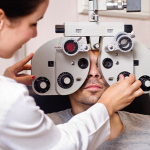Dr. Zuhal Butuner: Eye Health Tips for Older People
The effects of aging are never limited to creaky knees, wrinkles, and gray hair. According to Dr. Zuhal Butuner, advancing age is a risk factor for the development of conditions affecting the eyes. These include age-related macular degeneration (AMD), cataracts, and glaucoma. However, although these conditions are more common in people 50 and older, Dr. Zuhal Butuner says patients can minimize the risk.The way the body ages is different for everyone. That said, there is a lot of evidence that indicates that when you take care of your health as you age, it decreases the occurrence or effects of eye problems associated with aging.
It’s highly recommended that everyone have regular eye exams throughout their lifespan. But it is especially important to have a comprehensive eye exam at 40. The eye exam results will serve as a benchmark to track changes in the eye as we age. Also, while you can’t control a family history of AMD or glaucoma, lifestyle changes can reduce your risk of developing eye conditions.
For starters, you can stop smoking. Current or former smokers have up to four times the risk of developing AMD, the leading cause of blindness in the U.S., compared to those who never smoked. Moreover, the risk remains relatively high up to 20 years after quitting.
In fact, in a study conducted in Australia, it was estimated that as many as 20 percent of cases of AMD-related blindness might be related to smoking. Scientists say there are several reasons for the higher risk among smokers. It includes cellular changes, vascular constriction, and oxidative stress.
One’s weight can also impact eye health. Being overweight affects more than just the heart, blood pressure, and blood sugar control. The vision is affected too.

It’s also important to note that people with fair skin and blue eyes have a higher risk of developing cataracts, notes Dr. Zuhal Butuner. It is because melanin protects against the harmful effects of UV. It is a well-established fact that UV can increase the risk of cataracts to sun exposure. Exposure to ultraviolet (UV) light likewise increases the risk of AMD. The increased UV light is postulated to cause changes in the metabolism of the cells both in the retina and lens.
It’s important to wear sunglasses that protect against UV-A and UV-B wavelengths when you head outdoors. They should also wrap around your face since up to 20 percent of the sun’s rays can enter through the sides of typical glasses.
Finally, Dr. Zuhal Butuner mentions that exercise helps in improving eye health. Studies note that people who were physically active and ate healthily observed less vision loss over 20 years than those who didn’t exercise or have good nutritional diets.For more on Dr. Zuhal Butuner‘s insights on the health and wellness of the eyes, go to this webpage.






